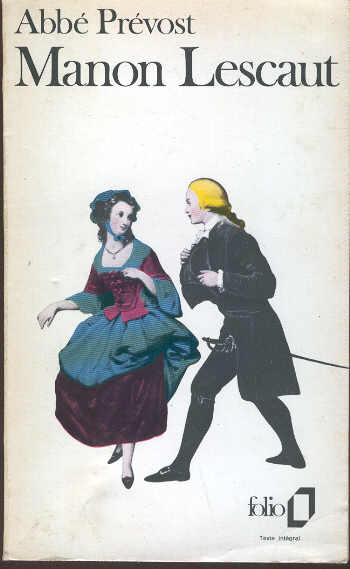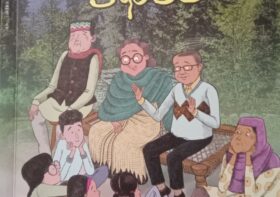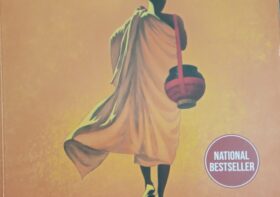Manon Lescaut – ఓ ప్రేమకథ

Manon Lescaut 1731లో వచ్చిన ప్రేమకథా నవలిక. రచయిత Abbe Prevost. అప్పటిలో చాలా వివాదస్పదమై, ఆ తర్వాతికాలంలో మంచి ప్రజాదరణ పొందిన రచనల్లో ఒకటి. స్త్రీ, పురుషుల మధ్య పుట్టే ప్రేమ, దానిగల అనేకానేక అడ్డంకుల గురించి ఓ ప్రేమికుని నోట వినిపించే కథ ఇది.
సిరిసంపదలుగల కుటుంబంలో పుట్టిన ’చెవలియర్ డి గ్రా’, మానన్ అనే అమ్మాయిని చూసి మనసు పారేసుకొని, ఆమెను పారీస్కు లేవదీసుకుపోతాడు. అక్కడ ఆమె కోరికల గుర్రానికి కళ్ళెం వేయలేక, ఆమెను వదలలేక నానా ఇబ్బంది పడుతుంటాడు. ఇంట్లో నుండి వెళ్ళిపోయినందుకు తండ్రి ఆగ్రహానికి గురవుతాడు. అత్యంత ఆప్తుడైన స్నేహితుని దగ్గరనుండి అప్పులు తీసుకోవడం నుండి చిన్న చిన్న జూదాలకు అలవాటుపడతాడు. చట్టబద్ధంగానో, చట్టవ్యతిరేకంగానో ఇతడు తీసుకొచ్చిన సంపాదన ఒకసారి దొంగలపాలై, మరో సారి మంట్లో మాడిమసైపోతుంది. అలా ఇతగాడి దగ్గర లేనప్పుడల్లా ఆమె వేరే ధనికునితో శారీరక సంబంధాలు పెట్టుకొని తన అవసరాలు, కోరికలు తీర్చుకుంటూ ఉంటుంది. ఇలా వేరొకరితో ఆమె సాన్నిహిత్యం భరించలేని అతడు ఆమె దగ్గరే మొరపెట్టుకుంటాడు. “మనసారా నేను నీ దాననే! నా శరీరాన్ని మాత్రం ఇందులోకి లాగకు. ఎంత ప్రేమున్నా కూడు లేకపోతే, ఎట్లా బతుకుతాం?” అని అడుగుతుంది. ఈ మాటల్ని ఎలా అర్థం చేసుకోవాలో అర్థంకాక విపరీతమైన వేదనను పడుతూనే ఆమెనే ఆరాధిస్తూ ఆమెతోనే ఉంటాడతడు.
మధ్యలో వాళ్ళ నాన్న ఇతడిని తీసుకొని పోయి నయానా, భయానా నచ్చచెప్పడానికి చూస్తాడు. లాభం ఉండదు. అబద్ధాలు చెప్పడం మొదలుకొని దొంగతనాలు చేయడం, హత్యలకు పూనుకోవడం వరకూ వస్తుంది వ్యవహారం. స్నేహితుడు పరిపరివిధాల చెప్పి చూస్తాడు. వినడు. ఆమెతోనే సర్వస్వం అని అన్నీ వదులుకుంటాడు. ఆఖరుకి తండ్రి, ఈ జంట వల్ల పరాభవం చెందిన మరో తండ్రి-కొడుకుల జంట కలిసి, వీళ్ళిద్దరీ విడదీయడానికి పూనుకుంటారు. ఆమె చేసిన పాపాలకుగానూ ఆమెను అప్పటికి కొత్త ప్రపంచమైన “అమెరికా”కు బంధీగా పంపించాలని నిర్ణయిస్తారు. అయినా ఇతగాడు ఎన్నో వ్యయప్రయాసలకోర్చి ఆమెతో పాటు ఆ కొత్త తీరాలకు తరలిపోతాడు. వర్గాలు, తరగతలు, బేధభావాలు లేని ఆ కొత్త సమాజంలో ఈ ప్రేమ జంట ఎట్టకేలకు కుదుటపడిందా? వీళ్ళ ప్రయాణం ఎలా సాగి ఏ తీరాన ఆగింది? అన్నది పుస్తకం చదివి తెల్సుకోవాల్సిందే!
ఫ్రెంచి సాహిత్యంలో మాస్టర్ పీస్గా భావించే ఈ నవలిక, చెప్పుకోడానికి ఓ జంట ప్రేమకథ అనుకోవచ్చు. పైపైన చదివితే అంతే అనిపించొచ్చు. కానీ ఈ రచనంతా first person narrativeలో కొనసాగుతుంది. దీనావస్థలో ఉన్న హీరోగారిని మీద జాలిపడి సాయం చేస్తాడో ఆసామి. కొన్నాళ్ళకు అతడే మళ్ళీ తారసపడతాడు. ఈసారి మన హీరో మరింత దీనావస్థలో ఉంటాడు. “ఏమయ్యా? ఏమిటి నీ కథా?” అని ఆ ఆసామి అడిగిన ప్రశ్నకు వచ్చిన సుధీర్ఘమైన జవాబు ఈ నవలిక. ఓ వంద పేజీల monologue. పైన చెప్పుకున్న కథ సారాంశంలో ఉన్న వలచిన చెలి, తండ్రి, స్నేహితుడు, వైరివర్గం అందరి గురించి ఇతడే చెప్తాడు. వాటిల్లో ఎన్ని నిజాలో, ఎన్ని అబద్ధాల్లో మనకి తెలీదు.
పైగా, ఈ కథను మొత్తం ఆమె పోయిన (ఎక్కడికి? అన్న దానికోసం పుస్తకం చదువుకోవాలి.) బాధ ఇంకా తీరకముందే చెప్పుకొస్తాడు. అందుకని ఇందులో భావోద్వేగాలు వాడిగా, వేడిగా ఉంటాయి. దానివల్ల పఠనం చకచకా సాగుతుంది. అయితే, పట్టలేనంత ప్రేమను భాషను ఆధారంగా చేసుకొని వడ్డించుకొనిపోతూ ఉంటే ఆవురావురమంటూ తినగలిగే వాళ్ళు కొంతమందే! మిగితావారికి వెగటు పుట్టుకురావచ్చు. చేసిన ప్రతి పాడుపనికీ, కూసిన ప్రతి పాపపు మాటకి ’ప్రేమ’ను అడ్డేస్తే, నమ్మే పెట్టేవాళ్ళు ఎంతమంది? ఓ ప్రేమకథకు మూలపురుషుడే అయినా, తన కథను ఎంత రసవత్తరంగా చెప్పుకొస్తున్నా, సదరు హీరోగారంటే అసహ్యం పుట్టే అవకాశాలూ లేకపోలేవు.
మానవ సంబంధాలు, ముఖ్యంగా యుక్త వయసులో ఆడా-మగా మధ్య ఏర్పడే సంబంధాల గురించి ఆలోజింపజేసే పుస్తకం. ఎన్నో ఆసక్తికరమైన ప్రశ్నలు లేవనెత్తే పుస్తకం.
పుస్తకం పాఠం ఇక్కడ.




Raj
Purnima,
Actually I skip all the writing assignments, and if I am not in the mood, even skip paying attention to what the lecturer is saying in the video, often doing some other reading. I do make notes and will come back to a lecture if I think I should pay attention to it. For example, Prof. Rabkin’s approach in the initial lectures, including Alice’s, seemed to me touch upon too much on the “illicit” aspects of the books, and this I am not too much keen on. Maybe later, but not now. The greatest benefit I derive is just a chance to use this pretext and read books, and my focus is on the writing skill, not the analysis or synthesis part of it. Your personalized reviews are fine, they are what we readers look for. If you do too much synthesis analysis sort of stuff, it’ll only appeal to critics, who otherwise are seasoned pontificators anyway. They’ll chew on anything you throw at them. On the internet everyone is a writer, or acts like one, and no one really is a reader, in a traditional sense. I don’t like that. I wish we had more readers, and less and less critics, but that’s just me. :- )
Raj
Purnima
Hey. I read this book as part of that course. And yeah, I am Prof. Weinstein’s student. I’m so glad about it. It’s like each of the book is opening new doors of looking at things. I’m like Alice in her wonderland, these days.
I wanted to mention in this post, that I read the book as part of the course. I even wrote a lengthier overview+review+views on this book. Later, posted only the overview part.
Is anybody else doing this course? I’ve not been able to be active enough in the discussion forums over there. I’d surely love some company here. Anybody?
Raj
You dog you, slyly even dropping the Alice reference :- ) Friendly tease, you know it. I am also going through the Fantasy course on Coursera, where the Alice is covered. I am “taking” both the courses, the “Fantasy and Science Fiction,” and “Fiction of Literature” and I must say I am more drawn towards “Fantasy and Science Fiction.” It is so amazing to realize that Aesop’s fables (and Panchatantra, Jataka etc.) tales are the pinnacle of concise writing.
On Manon Lescaut, I have mixed feelings on the Professor’s lecture. But I am only just beginning to read the book so I’ll reserve my judgment. Very glad that you are Weinstein’s student.
Raj
Purnima
@Raj.. I did have Prof. Rabkin on my mind, when I referred to Alice in my earlier comment. I couldn’t complete the Fantasy course the last time I’ve taken it. Hoping to meet deadlines and finish off “The Fiction of Relationship” to gain enough confidence to sign-in for signature track of Fantasy course in October. Seems like, you’re not much bothered about the writing assignments, which is good in it’s own ways.
Fantasy and sci-fi course is tad too analytic. If you’re enjoying it, you may like some of the essays in the “The collected essays of A.K.Ramanujan.” which analyse our very own folklore. Also, “Folktales from India” by the same author is an indispensable book, if you’re turning out to be a lover of folklore.
I’m being overwhelmed by The Fiction of Relationship course, because it is more like my kind of course, where synthesis is given preference. One constant complaint against my write-ups on pustakam.net had been that I tend to personalize a piece of fiction, and that I’m not giving the summary or the plot away. And now this course happens. I’m just over-joyed to have such a big platform like coursera.com now.
Enough of the rant. Good luck with your courses.
Raj
Good overview Purnima. A related note: Coursera.org is now running an interesting course (free) called “The Fiction of Relationship,” in which this book is read over multiple lectures by a Brown University professor.
https://www.coursera.org/course/relationship
There is certainly a need for similar lectures, reading Telugu literature.
Raj